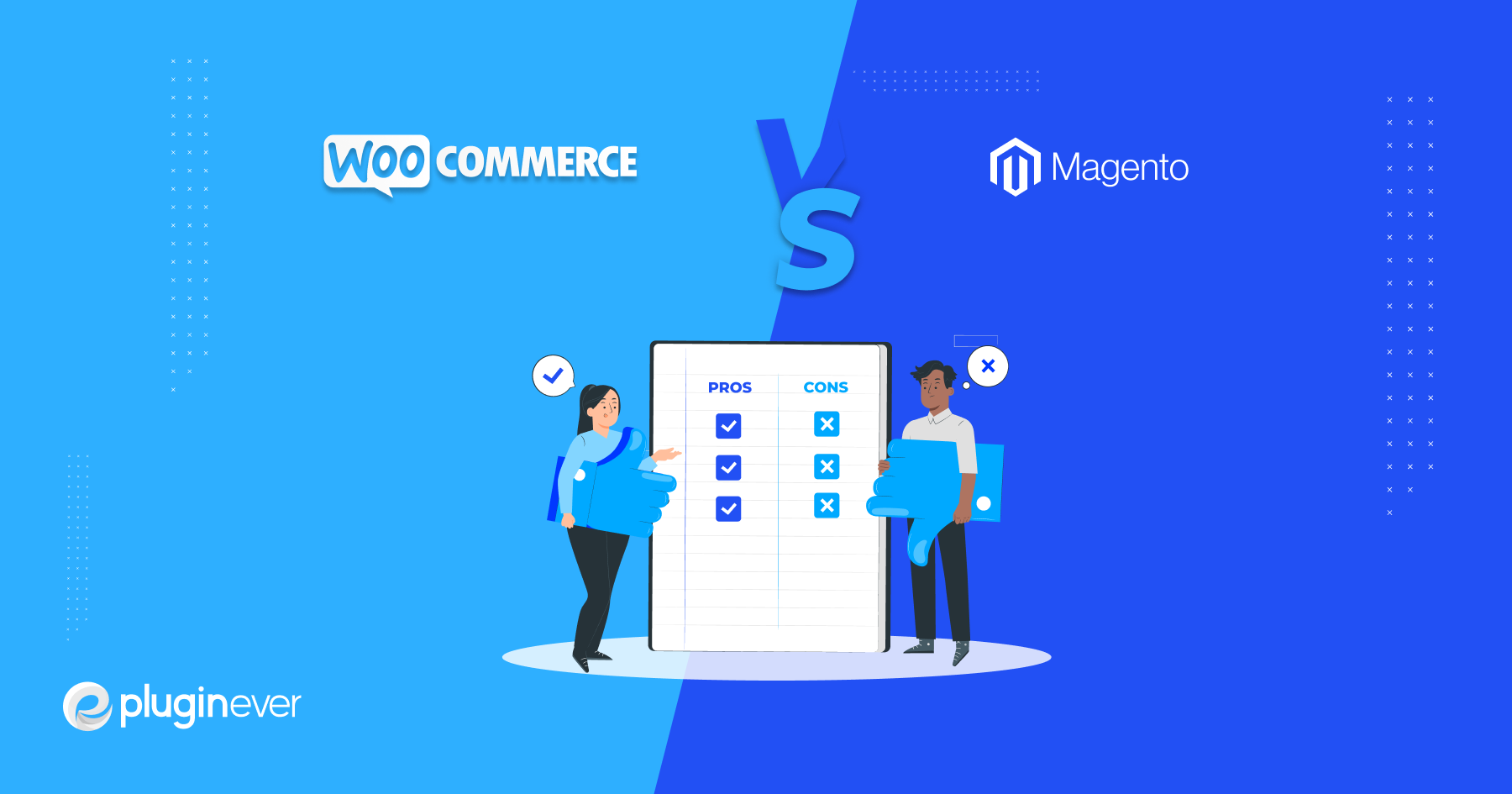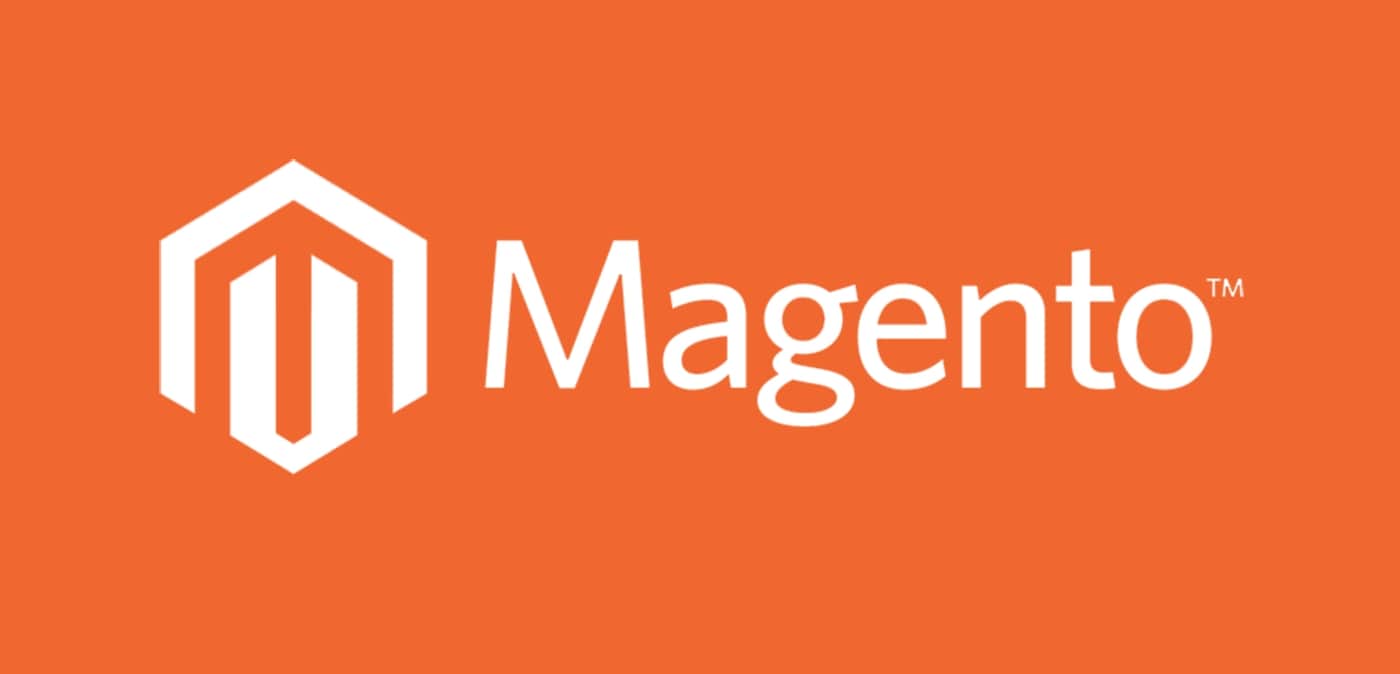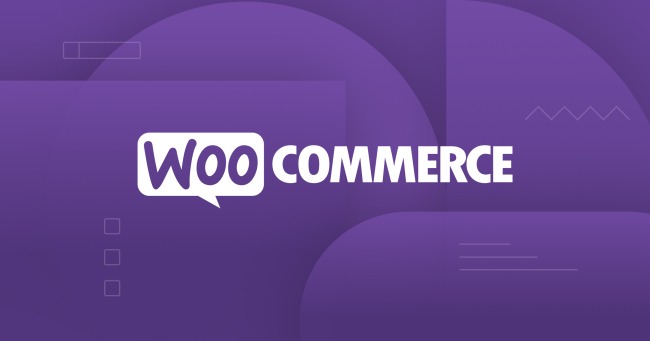Magento vs WooCommerce: Pros and Cons of The Top 2 E-commerce Platforms

Magento vs WooCommerce has been a never-ending debate for the last few years. The evolution of e-commerce businesses has been booming gigantically across the world and turns out, everyone is now arguing over these two e-commerce platforms.
If you already have an online business and are planning to open an e-commerce website, all you need to do is choose amongst these two popular e-commerce platforms.
Both Magento and WooCommerce have all it takes to push small businesses across the shores but the question remains, WooCommerce vs Magento which one should I choose?
If we talk about facts, Magento and WooCommerce have their own assets and liabilities. After going through all the details I might say that Magento is the best e-commerce platform but you might find the WooCommerce e-commerce platform more reliable and vice versa.
Without any more delay let’s jump into a more detailed discussion about WooCommerce vs Magento.
Both WooCommerce and Magento have their own unique features but before moving into the advanced features let’s talk a little about the common details they share.
Both e-commerce platforms are an all-in-one solution package for all your business needs. You can build an online store and develop your brand through online activities. You can manage your store, products, funnel, and target market, and also set up payment getaways.
Since both Magento and WooCommerce are open sources (free platforms) you can easily develop their features custom by yourself. So half of the Magento vs WooCommerce debate finishes here.
Now let’s move on to the details.
Magento

Magento is a self-sufficient open-source e-commerce platform that allows you to open an e-commerce business and set up online stores.
After its launch in 2007, Magento has been adding tons of versions to its bucket and gained a lot of attention. More than 250,000+ e-commerce businesses are using Magento websites right now.
Magento has two versions that are completely different from each other. One of them is Magento open source and the other is Magento commerce. The open-source is like a free version that lets you customize its features so you can do whatever you want with it. The Magento community loves it.
The commerce version also known as the Magento enterprise edition has all the premium resources in addition to cloud storage support but you can’t customize any of it. So I can say that you have to risk something to gain something.
Besides these, you can add third-party plugins into the platform to enhance your experience, and not just that, A global research company named Gartner announced Magento as a leader in Digital Commerce.
Key features
Magento vs WooCommerce both offer a variety of features that Magento users can’t get enough of. Since Magento is powered by Adobe Experience Cloud you are bound to get a meaningful experience of all other e-commerce platforms. Here are a few features:
- Solid Page Builder: You can use free themes, add custom pages, use drag-and-drop tools, and nurture the preview options. It has almost every point that your business needs. Some people call Magento the robust eCommerce platform just because of this feature.
- Store Management: The Magento store gives you full authority to control your inventory, sections, order procedure, payment methods, and everything else. For additional assistance, you will receive documentation support. Also, they release small patches to level up their store performance.
- Multi-Channel Selling: The Magento online store is not just about selling your product from a single website. This feature allows you to sell your products from any website you want. You can sell through Amazon, eBay, or any local e-commerce website, Magento gives you the privilege to do it all.
- Powerful Security: Magento will never put your business or you at risk. They will take all the measures to protect the information of your customers. They use PCI security standards that have dedicated security patches, another reason why the Magento community is loyal to its services.
- Full Enhanced Performance: With the assistance of the Adobe Experience Cloud, Magento is keen on providing consistently optimized performance.
- Additional Upgrades: Sometimes the built-in features of an e-commerce store are not enough, that’s why you can add plugins and integrations to Magento for a smoother experience.
Pros
- Supports an unlimited number of products
- Exclusive theming features with layout system
- Built-in scalability for larger stores
- Efficient checkout procedure for customers
- Can be integrated with multiple platforms
- Efficient Application Programming Interfaces
- Allows customers to checkout as guests by default
Cons
- More matched towards developers instead of business owners
- Some versions can be very costly
Pricing
Magento vs WooCommerce both are free products with an open-source platform, you can just download and customize them the way you want. You will need to spend some money on your hosting provider and additional web hosting costs.
Also if you are interested in the Magento enterprise edition then that will cost you a good amount of money.
WooCommerce

Rhymed with the word e-commerce, WooCommerce is a very famous eCommerce platform for all WordPress users. After being launched in 2011, WooCommerce has been turning WordPress websites into e-commerce businesses.
To this day there are 4000,000+ WooCommerce websites in the world.
WooCommerce offers all the support, extensions, and functionalities to build an online store. Most of the store owners of woo-commerce stores are past WordPress website users. Since WordPress controls nearly 50% of the CMS market share, WooCommerce has secured its strong point in this area.
Both WooCommerce and Magento share the open-source code with their customers yet a few key factors will set them apart.
Related Reading: Google Integration with WooCommerce: Here is all you need to know
Key features
Online store owners are nurturing both Magento and WooCommerce features just to see who wins the Magento vs WooCommerce debate. Magento might have some amazing tools in its pocket but let’s check a few features WooCommerce offers.
- Unlimited Themes: Using a WooCommerce store you can design your online store any way you want using countless themes. WooCommerce is the only e-commerce platform to provide this much theme to their customers.
- Huge Customizations: WooCommerce gives you access to premium extensions, integrations, and API, and with basic technical knowledge you can turn a WordPress plugin into a WooCommerce plugin.
- Built-in blog: Search engines often rank your business based on content marketing and SEO. Keeping that in mind WooCommerce has a pre-built blogging platform. This is very effective and suits small businesses more.
- Sell almost anything: There is no limit on what you can sell using WooCommerce. It can be physical and digital products, services, appointments, tickets, etc. anything at an unlimited number to grow your online sales.
- Shape up your store: Using the product management features you can add tags, filters, attributes, details, categories, etc. to organize your WooCommerce store.
- Purchasing and Shipping: Using built-in or extra features you can add payment details and options for a smooth purchasing experience for your customers. WooCommerce stores support coupons and product upselling as well with a one-click refund policy.
- In terms of shipping carriers, customers can choose between local, express, and free shipping based on geolocation.
- Customer Profile: Your customers can create their own profile at your shop to keep track of all past and current orders.
- WooCommerce Community: The best part about WooCommerce is that its community is 24/7 online to help you regarding anything. From extensive documentation support to a steep learning curve, you’ll find everything there.
Pros
- Setting up a store is free of cost
- Extensive documentation and team support for business owners
- Can be integrated with Google Analytics and other platforms
- Easy to get used to for WordPress users for being a parent platform
- Involves SSL Support but it needs to be acquired by your own certificate
Cons
- If you have no experience in using WordPress then you’ll need to learn two new platforms
- Premium resources and extensions are a little costly.
Pricing
Similar to Magento, WooCommerce is also a free product with paid extensions. Offering an open-source platform, it lets you download and customize it on your own. But the premium offerings, web hosting costs, and all these can be very expensive.
According to the WooCommerce business pricing model, they earn from their premium services.
What to look for in an eCommerce Platform
Let’s pause the Magento vs WooCommerce debate and ask ourselves, what should I look for in an eCommerce platform? Are you into this debate just for their popularity or are you trying to come to a conclusion?
Let’s not create more confusion and find out what we need to keep an eye out for.
Every different e-commerce platform will affect your online store differently. The way you choose your platform will affect your customer’s shopping experience, backend optimization, marketing efforts, and the money you are investing in it.
There will always remain arguments and you can even switch from both Magento to WooCommerce and vice versa. So that process contains a lot of web development work and you won’t want to go through that much trouble.
So before selecting a platform, you’ll need to keep in mind a few pointers-
- How easily can you use the platform?
- How much are you willing to pay for the platform?
- How many payment gateways can you use? (Local and Global)
- Can you use third-party integrations with the platform’s services?
- Is the platform flexible to use and offers premium resources for use?
- Can the platform handle the pressure when your online store evolves into a larger store?
These 6 pointers are enough to identify the perfect e-commerce platform. So make sure you align these with your platform.
Now let’s resume the Magento vs WooCommerce debate.
Magento vs WooCommerce: Detailed Comparison

We have already discussed the key features, pros, and cons of WooCommerce vs Magento but now it’ll be a side-by-side detailed comparison of how both e-commerce platforms operate.
Performance
In terms of the performance of an e-commerce website, the loading speed and availability are highly important. Try to find a dedicated server so you can provide a smooth experience to your customers.
Magento has had a few errors when its loading speed and availability time were measured. It all depends on how much time the CMS needs to generate HTML code and send it back to the browser. According to the findings of multiple analyses, even after having high traffic, Magento has a stable availability rate.
The loading speed is not charming but it will do. When accessing the cart tab or product details Magento takes a bit more milliseconds than usual. But with more versions like Magento 2.0 and Magento Commerce, the speed is improving.
WooCommerce vs Magento, none of them met our high expectations but it does have a high availability like Magento. Looking over the average load speed of each page I will say that Magento has a better loading speed compared with WooCommerce.
Extensions and Plugins
The only reason why the development team is keen on using extensions and plugins is that in Magento vs WooCommerce, none of them are genuinely perfect.
Extensions are used to enhance customer support, payments, security, accounting, marketing, finances, etc. Magento and WooCommerce both have a mixture of free and premium resources for all the solutions.
Magento has extensions with rich features that can make your store more strong due to the robust extension system but if you fail to install it carefully then it will not work.
WooCommerce on the other hand has more extensions than Magento with cheap prices but they do not make your store as powerful as Magento. So Magento has the upper hand here.
Security
As a business owner, it is your responsibility to secure the personal and payment information of your customers. Magento vs WooCommerce both have advanced security features but it’s better to maintain caution. Magento and WooCommerce both have manual operating options in terms of security.
It’s true that no e-commerce platform can guarantee 10/10 security, Magento offers a few dedicated security patches. But the issue is they are hard to apply. If you are new to all these you’ll have to go through some difficult times to apply changes. You might even end up messing things up.
Magento vs WooCommerce are both trusted but the dedicated patches of Magento Commerce for its online stores will put Magento in front of WooCommerce.
Product Management
E-commerce platforms are all about product management and WooCommerce is very straightforward in this situation. As I mentioned before you can sell both digital and physical products on WooCommerce. They have put together a simple process for you to loop in.
If you are a former WordPress user you can simply add products to your online store using the WordPress dashboard and product add-on plugin. How much functionality do you need? Because WooCommerce has it all.
Magento also offers a few features that WooCommerce doesn’t have. Moreover, in Magento, you don’t need extensions to add products.
All the advanced features Magento provides are sometimes a little too much but it gives more functionality. If we look at things in a simpler way then WooCommerce is way better than Magento but if you are looking for advanced features in product management then hook up with Magento.
SEO and Marketing
With the functionality of SEO and Marketing, you can scale up your website up the charts. Magento vs WooCommerce is going head to head here.
In Magento 2.0 and Magento commerce, most of the features are built-in. They work as the core of your website. WooCommerce on the other hand needs the use of plugins to maintain its consistency in SEO but don’t worry, they are a one-tap setup.
WooCommerce provides a built-in blog section on your website which Magento doesn’t but you can add it anyway.
Related Reading: 7 Best SEO Plugins for WooCommerce | Improve Your Site’s Ranking
Ease of Use
It’s always fun to hear that Magento is a very powerful platform and WooCommerce has a lot of features but at the end of the day it always comes down to that one question. Is that platform easy to use?
As discussed previously, WooCommerce is a lot like WordPress and that makes it more simple to use. According to the reviews and testimonials, WooCommerce users experienced a smooth experience throughout their journey. You might find it a little difficult to build up the store but that’s just it.
No more hassle. You can build up a site more quickly using WooCommerce and even the plugins are easy to set up.
Overall WooCommerce is gaining a lot of attention due to its simplicity. Magento open source is just as similar to WooCommerce but you need to have the technical knowledge to maintain Magento which you don’t need in WooCommerce.
You might think Magento is a little tough to use when you’re roaming around the admin panel.
In terms of customizations, all the features are built-in in Magento and there is also the drag and drop option. The themes are all very much attractive but when it comes to setting up plugins and other extensions it’s again a little tough to handle.
Magento vs WooCommerce, It is understandable that Magento is a powerful platform it’s sometimes hard to use it. But WooCommerce comes on top in terms of simplicity.
Support
When people all around the world are fighting over the two best e-commerce platforms, it is understandable that they have to have a strong supportive community all over the world. Magento has two types of communities in its hands. The open-source community and the enterprise community.
All the users usually discuss in the Magento forum but in terms of the default support system, Magento enterprise users receive a lot of extra guides that the other community doesn’t.
WooCommerce doesn’t have a built-in powerful support system, they have its own community which is big and they help each other out 24/7.
Almost anyone can get help from the WooCommerce support community and they don’t have two or three different communities, just one. WooCommerce support community is bigger and better than Magento but if you face any technical issues try reaching out to an expert developer for assistance.
Pricing
Magento vs WooCommerce the last pointer that this debate needs to discuss is the pricing.
Sometimes we don’t even care about the features or the quality, we just see which one costs less and then just buy it. WooCommerce is completely free to use while Magento only offers a free version of itself for you to use.
This clears out a lot in the WooCommerce vs Magento debate because you can’t really do much with the free version.
If you want to buy Magento’s premium versions then you will have to talk to their sales team. To lower the cost if you try to rely on extensions you’ll get some for free but the better ones will cost you as well.
WooCommerce on the other hand is a free-to-use platform. But all the cost is hidden in the extensions. Despite the free extensions, if you want a seamless experience with WooCommerce then spend some money on the premium plugins.
WooCommerce vs Magento is amazing. Magento is definitely worth the money but WooCommerce remains the best cheapest e-commerce platform out there.
Magento vs WooCommerce: Winner Announcement

If it comes to power then Magento wins the debate but if it comes to simplicity then WooCommerce. From the overall perspective, I would say that WooCommerce is the best e-commerce platform.
Let me give you a small suggestion. If you are planning to start a new online store then choose WooCommerce and when you grow enough, shift to Magento. That’s how you play the game.
Related Reading: Best WooCommerce Plugins of 2021 That You Must Have